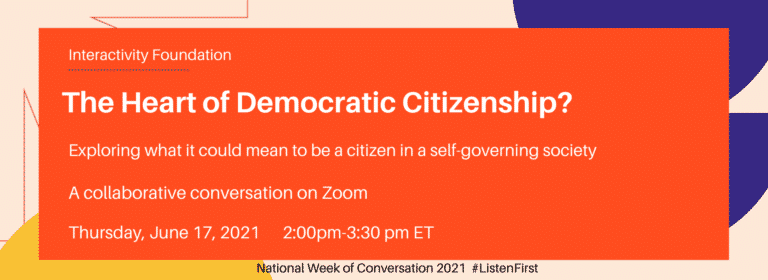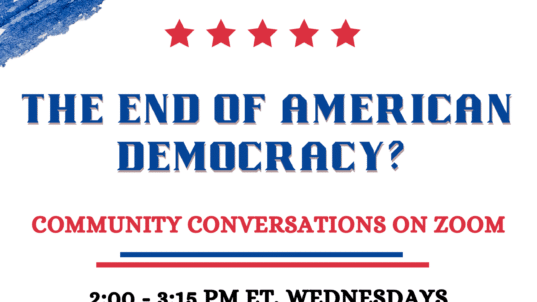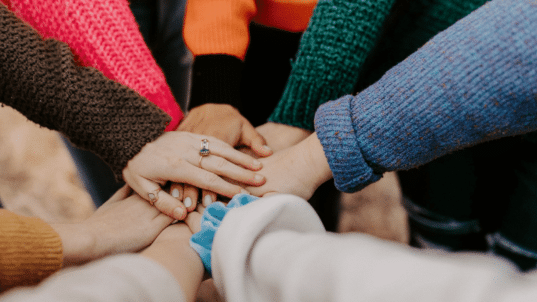 An exploratory discussion of the meaning of the office of citizen in a self-governing society.
An exploratory discussion of the meaning of the office of citizen in a self-governing society.
“In a democracy, the highest office is the office of citizen.”– Felix Frankfurter, Supreme Court Justice
A diverse group of citizens from all across the country and the political spectrum enthusiastically participated in this online, exploratory community conversation on Thursday, June 17, 2021. These participants engaged with each other and a series of key questions about citizenship in a democratic or self-governing society as they explored and expanded on their diverse ideas.
Some of the key questions that prompted their robust discussion:
- What does it feel like, and what should it feel like to be a democratic citizen?
- What does it mean, or what’s something that shows what it means to be a participant in a self-governing society?
- What are some of the different roles and responsibilities of the most important “office of citizen” in a democracy?
- Also, what are some of the “make or break” components or essential features of democratic citizenship? What couldn’t (or shouldn’t) you do without?
- Finally, what’s your most positive, expansive vision of citizenship in a democratic or self-governing society? What are citizens doing in your ideal democracy, and how does it or might it all work?
While each of the three small-group conversations was unique, there were also a lot of common themes. Below, we’ve attempted to summarize many of the key ideas and themes from all three groups’ discussions of the Heart of Democratic Citizenship.
This online community conversation was part of the National Week of Conversation organized by the ListenFirst Coalition. #ListenFirst
Discussion Summary
How does it feel to be a citizen in a self-governing society? And/or how should it feel?
- Engaged, like you’re needed, you’re contributing, you’re valued, and you’re making some difference
- It feels good, “self-actualized”, like you’re serving your fellow citizens
- Involved, actively taking part in the process of our society
- Optimistic, hopeful…that people matter and can sometimes act together for the common good (or at least to better avoid the common bad)
- Scary, risky, vulnerable; anxious. Where are we going? Who is driving? Do the brakes work, and where are the guardrails?
- Trusting; others trust me enough to ask my opinion and count my vote, and I have to do the same.
- Brave, like accepting the risks and going forward anyway because it’s the right thing to do
- Inclusive, included; everyone has a voice and like you’re part of a bigger—and very diverse—whole.
- A sense of wanting to take part
- All of the “spirits”—spirit of service, of the common good
- We have to respect our fellow citizens and ourselves, no matter our differences.
- It, democracy, is like a “presence”—and mostly a good one
- Empowering; my voice, your voice, our voices, opinions, and perspectives matter or are at least heard in shaping policy
- Responsible, like you’re needed, you have a duty, and you have to step up and fulfill it
- Flexible and contingent—our collective answers keep changing, hopefully and only generally—but not necessarily—for the better
- Collaborative, cooperative, like a group project
- Better than the alternatives
- A shared commitment to the community, to the country, even if we disagree
- Free
What are some of the roles and responsibilities of the Office of Citizen?
- To vote—free and fair elections; access to the ballot
- To protest, to “shake up” the systems that need it
- Everyone has to do their part
- Citizens need to be consulted, asked, and involved in making policy
- To cultivate that habits and the virtues that support and sustain democracy
- To care about others
- To diligently protect the rights, interests, and futures of others—especially those different from yourself and/or with whom you disagree
- To act for the common good and have ideals beyond your own self interest
- To be educated and informed about the issues, the candidates, the public affairs of their community, state and country
- To be responsible to others, to be engaged, involved, active in society and governance
- To have a working understanding of basic civics, of the processes of self-governance
- To exercise our freedoms—especially to think, communicate, associate, deliberate and act freely
- To be absolutely committed to seeking and following the truth and without regard to ego or other self interest
- To innovate, to recognize good, better, and great ideas and better ways of doing things
- To bravely express ideas outside the mainstream and not repress minority views
- To speak up and to be open to other’s ideas and to criticisms of your own
- To listen to others and to opposing views and attempt to understand them
- To embrace equality, justice, freedom/liberty, integrity/honesty, generosity, the common good
- To serve your country
- To work together to solve problems
- To be open to change, to be flexible
- To be willing to compromise
- To be committed to civil discourse and disagreement, to cooperation and collaboration
- To protect and defend democracy, including the right to vote, to protest, to disagree, and to respect the outcome of elections
- To show up, to speak up, and respect others’ rights to do the same
What are some of the make or break features of democratic citizenship?
- The vote: free and fair elections, access to the ballot, and relatively equitable voting rights for all; that all votes count equally, more or less (counter to current situations where votes don’t count equally, as in the case of the Senate or with racial or partisan gerrymandering).
- Access to accurate, reliable, truthful information about our government, our candidates, the issues, etc. A free press; a professional press with journalistic ethics. Freedom of information acts and public meetings laws.
- Civil liberties, civil rights enshrined in a constitution and protected by an independent judiciary. A constitution and a bill of rights.
- Representative government—legislatures and legislators that represent all the citizens of their jurisdiction; some system of collective decision-making.
- Public and widespread commitments to—
- the rule of law and nonviolence in general and especially in resolving political conflict
- protect and expand voting rights and access
- free and fair election processes
- respecting the outcome of elections and the peaceful transfer of power
- civil rights for all citizens
- the common good
- consult, listen, and deliberate freely and civilly with others
- compromise, flexibility, cooperation
- the truth
- That citizens and the governments we form actually believe in and are committed to democracy.
- Education—effective, universal, accessible; that includes civics and media literacy
- Time: better work/life balance (and higher wages?) and childcare so that citizens have the time to learn about the issues, to attend the meetings, to volunteer, to provide public service
- A nonpartisan, independent judiciary, law enforcement, and penal system that equally protect, defend, and respect the rights of all citizens
- Inclusiveness –everyone should have a voice and place at the table
- A sense of the common good and some corresponding sense of encouragement for our better angels: rewarding actors and acts in furtherance of the common good. Also curbing our selfish and fearful proclivities: our acquisitiveness/consumerism; fear, and sectarian and tribal violence and exclusion
- Equality, under the law and in practice/opportunity/systemically, and for all races, ethnicities, genders, ages, abilities, economic classes, etc.
- Citizens repeatedly willing, ready, and able to step up, engage, advocate for, and defend these features; to take the long and difficult road to make positive change happen
What are some of our most positive, expansive visions of what citizenship in a democratic or self-governing society could be?
- See the above; having the minimal or essential components above would be a huge improvement over where we are now. In other words, we have fallen short of the make or break features required for democratic citizenship.
- Citizens regard their role as a democratic citizen as primary to their role as an employee or wage earner. Their work weeks would center on the work of citizenship. Employment would be conforming to and complementary of the demands of citizenship
- Public trust is greatly strengthened. Citizens can have much greater trust in the basic behaviors and actions of their political leaders, their governments and other public institutions, and their fellow citizens. Disagreements will always remain, but they won’t spawn existential crises and conflicts.
- Citizens have easy access to reliable information (misinformation and disinformation has been minimized). Fact checking is regularized, medial literacy is high, and there is little to no demand or appreciation for disinformation, misinformation, conspiracy theories, etc.
- Technology would help—
- scale up citizen participation in our democracy and make it easier to include more voices
- allow for more input and anonymous feedback, which can encourage citizens to generate innovative policy ideas without fear of repercussions
- improve communication between citizens and government
- provide enhanced ways for citizens to collaborate with each other and with government.
- Meetings on public matters are actually fun and widely attended by regular citizens.
- Public discourse is largely free from alienating (and often obscuring) jargon
- Attendees are allowed to contribute; they’re being talked with, not to
- Meetings are short, and they include refreshments, and they’re in accessible, pedestrian friendly public spaces.
- There are enough different topics and venues for everyone to find something to match their interests.
- The role of citizens in actually making public policy would be greatly expanded. Citizen juries (like our current judicial jury system) would involve regular citizens on a rotating basis and draw from every sector of society.
- There would be rewards—both material and psychological or social—for contributing to public life and building social capital. Citizens would get “social credits” for their participation and good work.
- Whistleblowers and innovators are respected and rewarded rather than threatened.
- More, if not most, citizens vote and otherwise participate in public life.
- There would be dedicated “Civic Time” for all citizens to devote to democracy and democratic life (similar to the model where Google gives employees time for innovation)
- Political affairs are generally considered more important, more uplifting, and more engaging than shopping, Facebook, football games, video games, or, even, competitive bass fishing.
- Citizens of all ages are much more educated about—
- civics—how their government works (or doesn’t)
- the issues
- the candidates
- how to evaluate and interpret good (and bad) information, the authorities, experts, original sources, etc.
- Citizens are thinking more about the next generation and training them to effectively engage in political life and public service. Children are more involved with and have greater opportunities to learn by doing by participating in public life. Perhaps there are political representatives for the next generation and for the environment.
- There are limits on campaign spending (possibly even public financing for campaigns), the length of campaigns, on campaign commercials, etc.
- Corporations and other commercial entities and legal fictions once again pay their fair share of taxes and can no longer claim the same (or superior) rights under the Constitution as natural persons.
- Citizens regard the practice of governing and politics positively, as an exalted activity, like public service, and as opposed to something inherently dirty, corrupt, self-interested or a sucker’s game.
- Some citizens and issues are engaged on a global level: e.g., global warming, the environment, international trade, human rights, etc.
- Resilience and sustainability are heightened as considerations for all public institutions. How can we reinforce them now so they can better withstand the inevitable and unknown crises to come?



